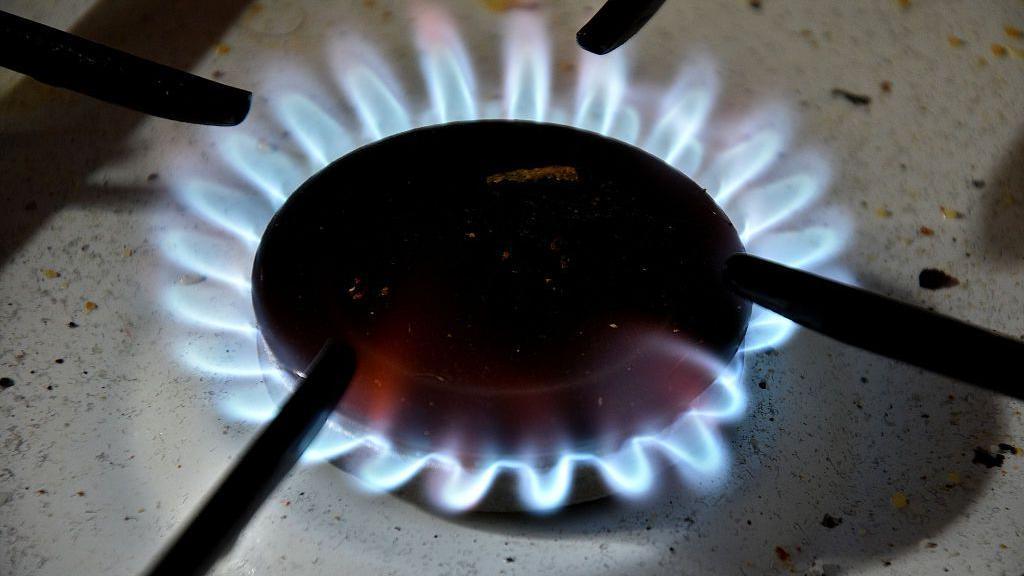NI energy prices remain stable heading into winter

Energy prices have come down from their record peaks in 2022
- Published
With the weather getting colder, more households across Northern Ireland will be thinking about turning their heating on and how much that will cost them.
Energy prices have come down from their record peaks in 2022 but have stabilised at a level higher than back in 2021 before Russia's invasion of Ukraine.
Gas and electricity prices rose by 10% in England, Scotland, and Wales on 1 October, but the energy market is different in Northern Ireland.
The Utility Regulator in Northern Ireland says there will not be any price changes in October to the suppliers that it regulates: Power NI for electricity, SSE Airtricity for gas in Greater Belfast, and Firmus for gas in the Ten Towns area.
This does not rule out price increases in future months, but they are not imminent.

Raymond Gormley says stability in the market should bring comfort
Head of Energy Policy at the Consumer Council Raymond Gormley said this stability should bring comfort to some households after record rises.
"Even if prices are higher than they were a few years ago, as long as they remain stable, that's a good thing," he said.
"If you remember back to the energy crisis, prices were going up 30-40% at a time and people were moving from one shock to another, whereas if there's stability, people can plan around that."
He said it is a good time to prepare for winter if people can afford to do so.
"Oil prices are very good value for money, so for homes with home heating oil, have a look at your heating tanks; if you need oil, it's a good time to get it.
"The same goes with gas. If you have a pay as you go meter and have a few spare pounds, top up your meter and build up some credit for the winter months."
So how do prices compare to last year?
Oil
About two-thirds of households in Northern Ireland heat their homes using oil.
The cost of home heating oil is about 20% lower than last year.
For example, 500 litres of home heating oil were £295.88 last week; that's about £71 cheaper than the same time last year, according to Consumer Council data.
But it is still more expensive than 2021 levels.
Electricity
Power NI is the largest electricity supplier in Northern Ireland and the only regulated supplier in Northern Ireland.
The utility regulator has not announced any change to its prices since October.
A typical Power NI annual household bill is £951, down £64 from October 2023.
SSE's typical annual household bill is £1,182, down £93 from October 2023.
Meanwhile, Budget Energy customers typical annual bills are down £229 to £1,234 and for Electric Ireland customers the cost is £1,169, a reduction of £207.
Click Energy's typical annual household bill is £1,132, meaning no change to October 2023, and Share Energy, a new supplier, has an annual bill of £858.
Suppliers can offer discounts based on how and when you choose to pay, but overall their standard prices are cheaper or equal to last year.
Gas

UK natural gas prices are down slightly, about 5% compared to this time last year
UK natural gas prices are down slightly, about 5% compared to this time last year.
SSE Airtricity: Typical household annual bill: £1,079, down from £1,399 in October 2023
Firmus (Greater Belfast): Typical annual household bill: £1,281, down from £1,518 in October 2023
Firmus (Ten Towns): Typical household bill: £1,151, down from £1,363 in October 2023
How do household energy bills in NI compare to rest of UK and Republic of Ireland?
The price cap operates in England, Scotland and Wales which means gas and electricity prices will rise by 10% from October.
Regulated average annual electricity bills in Northern Ireland (£951) are currently lower than Great Britain (£1,070) and the Republic (1,291.)
However a typical regulated annual gas bill, whether you’re with SSE Airtricity in Greater Belfast (1,079) or Firmus in the Ten Towns area (£1,151) is more expensive than in Great Britain (£920) but cheaper than the Republic (£1,359.)
That means a combined regulated electricity and gas annual bill (whether with SSE Airtricity (£2,030) or Firmus Ten Towns (£2,102) is more expensive than Great Britain (£1,990) but cheaper than the Republic (£2,650.)
Petrol
Average prices at the pumps are also lower than this time last year.
According to Consumer Council data, last week petrol was 135.4p and diesel was 137.6p, down from 149.8p for petrol in October 2023 and 151.7p for diesel.
So is the cost-of-living crisis over?
The short answer is no—while energy prices have come down from their record peaks, many households are unlikely to feel better off because of other cost pressures like their mortgage repayments, rental costs, or childcare bills.
Raymond Gormley said: "If you are struggling with electricity or gas bills, reach out to your suppliers, as they are very keen to help people and can offer help.
"I wouldn't say the cost of living crisis is over for a lot of people; there are a lot of other costs out there that people are being stretched to meet.
"Although things are a bit better, it won't feel like that for everyone."
What about businesses?
Businesses customers pay different rates for their energy.
Unlike households, businesses face paying more for their electricity as a result of an increase in fixed costs.
About 40% of a typical household and business electricity bill is made up of a basket of fixed costs.
Those fixed costs are to increase by 17% from 1 October because of the cost of compensating renewable generation and the cost of thermal generation when there are not enough renewables in the system.
There will be no immediate impact on household bills, but business customers face higher prices imminently.
Capacity costs are increasing because of increased demand across the island of Ireland as well as the cost of retiring old generators like Kilroot, which ended coal generation last year.
The amount that the grid operator SONI charges to suppliers is set to increase by 83%, which the regulator says is necessary to stabilise the network in the shift towards renewables.